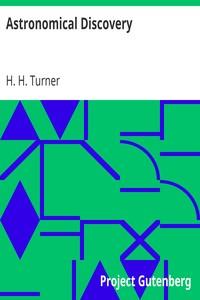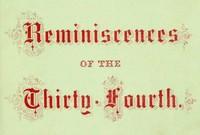|
|
Read this ebook for free! No credit card needed, absolutely nothing to pay.Words: 48163 in 19 pages
This is an ebook sharing website. You can read the uploaded ebooks for free here. No credit cards needed, nothing to pay. If you want to own a digital copy of the ebook, or want to read offline with your favorite ebook-reader, then you can choose to buy and download the ebook. INDEX 221 LIST OF PLATES PLATE ERRATA " 145, See note on page 220. ASTRONOMICAL DISCOVERY URANUS AND EROS Discovery is expected from an astronomer. The lay mind scarcely thinks of a naturalist nowadays discovering new animals, or of a chemist as finding new elements save on rare occasions; but it does think of the astronomer as making discoveries. The popular imagination pictures him spending the whole night in watching the skies from a high tower through a long telescope, occasionally rewarded by the finding of something new, without much mental effort. I propose to compare with this romantic picture some of the actual facts, some of the ways in which discoveries are really made; and if we find that the image and the reality differ, I hope that the romance will nevertheless not be thereby destroyed, but may adapt itself to conditions more closely resembling the facts. The popular conception finds expression in the lines of Keats:-- Then felt I like some watcher of the skies When a new planet swims into his ken. Keats was born in 1795, published his first volume of poems in 1817, and died in 1821. At the time when he wrote the discovery of planets was comparatively novel in human experience. Uranus had been found by William Herschel in 1781, and in the years 1800 to 1807 followed the first four minor planets, a number destined to remain without additions for nearly forty years. It would be absurd to read any exact allusion into the words quoted, when we remember the whole circumstances under which they were written; but perhaps I may be forgiven if I compare them especially with the actual discovery of the planet Uranus, for the reason that this was by far the largest of the five--far larger than any other planet known except Jupiter and Saturn, while the others were far smaller--and that Keats is using throughout the poem metaphors drawn from the first glimpses of "vast expanses" of land or water. Perhaps I may reproduce the whole sonnet. His friend C. C. Clarke had put before him Chapman's "paraphrase" of Homer, and they sat up till daylight to read it, "Keats shouting with delight as some passage of especial energy struck his imagination. At ten o'clock the next morning Mr. Clarke found the sonnet on his breakfast-table." Much have I travell'd in the realms of gold, And many goodly states and kingdoms seen; Round many western islands have I been Which bards in fealty to Apollo hold. Oft of one wide expanse had I been told That deep-brow'd Homer ruled as his demesne; Yet did I never breathe its pure serene Till I heard Chapman speak out loud and bold: Then felt I like some watcher of the skies When a new planet swims into his ken; Or like stout Cortez when with eagle eyes He star'd at the Pacific--and all his men Look'd at each other with a wild surmise-- Silent, upon a peak in Darien. Free books android app tbrJar TBR JAR Read Free books online gutenberg More posts by @FreeBooks
: The Welsh and Their Literature from The London Quarterly Review January 1861 American Edition by Borrow George - Welsh literature History and criticism@FreeBooksWed 07 Jun, 2023

: Worrying Won't Win by Glass Montague - World War 1914-1918 United States; World War 1914-1918 Caricatures and cartoons World War I@FreeBooksWed 07 Jun, 2023
|
Terms of Use Stock Market News! © gutenberg.org.in2025 All Rights reserved.






